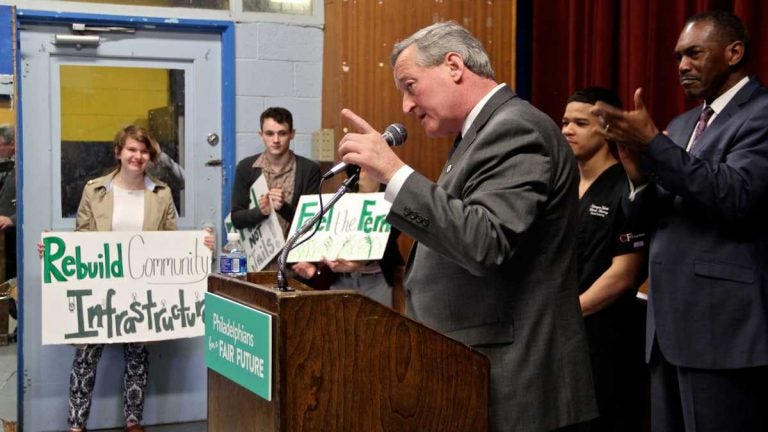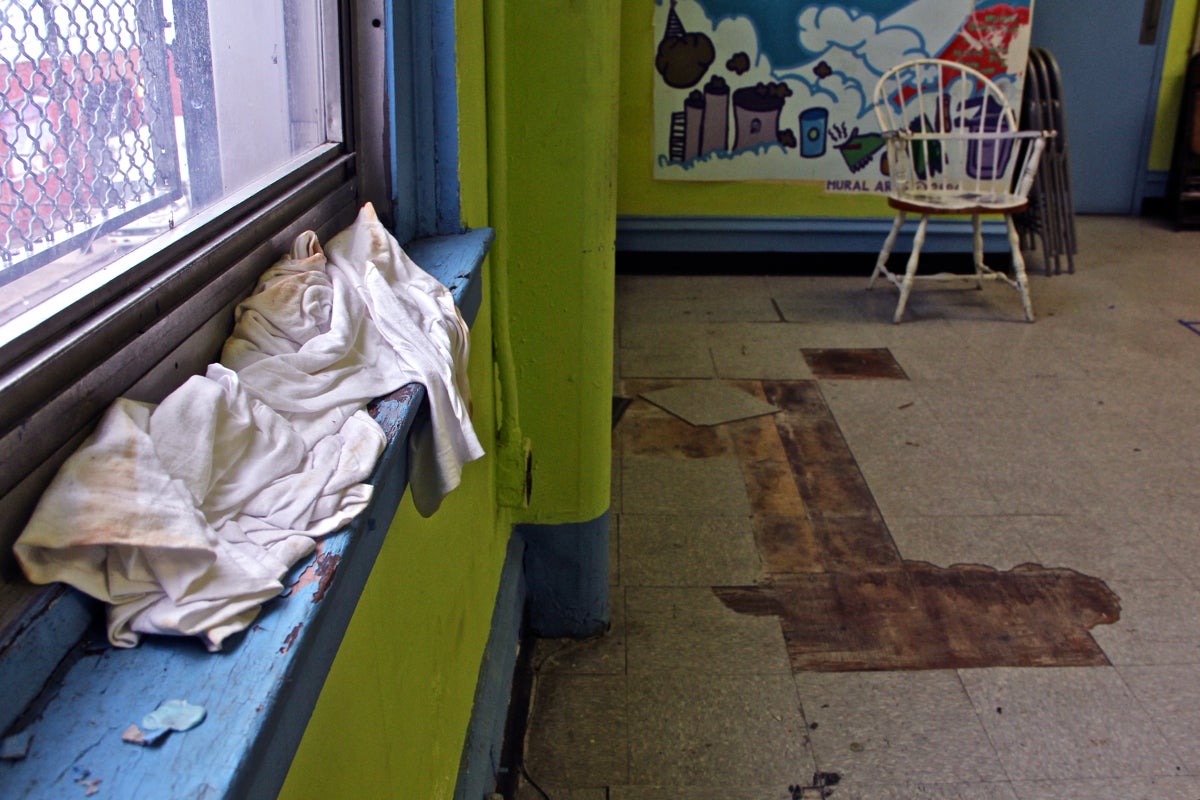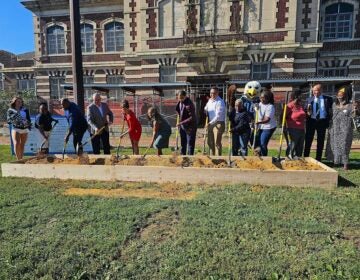Philly mayor threatens council over lagging rec center rebuild
In a fiery letter, Philadelphia’s mayor said he’s willing to scale back an effort to rebuild parks, rec centers, and libraries to sidestep City Council’s approval.

Mayor Kenney pitches sugary drink tax as key for his Pre-K and Rebuild initiatives, March 2016 (Emma Lee/WHYY)
In a fiery letter sent on Friday, Philadelphia Mayor Jim Kenney told City Council that he is willing to scale back his signature rec center, playground, and library improvement effort in order to sidestep requirements for council approvals and move forward with the long-delayed Rebuild initiative without the legislative body’s sign-off.
“The lack of progress has put the program in doubt for all Philadelphians eagerly awaiting investments,” Kenney wrote in the letter addressed to Council President Darrell Clarke. “Additionally, as we stand ready to begin spending on these projects, any further delay will negatively impact our ability to leverage outside funding for the program. This situation is unacceptable, and the residents of Philadelphia deserve immediate action. For that reason, I am adjusting the program to begin the immediate expenditure of funds.”
Sent on a sunny Friday at the tail end of the city’s fiscal year 2019 budget process, the letter lit up smartphones across the city’s political circles with speculation about the mayor’s endgame. One City Hall staffer characterized the letter as a “threat” to members of council, a clear-cut signal that Kenney’s patience has worn thin with what the mayor believes is a do-nothing council.
‘The straw that broke the camel’s back’
It’s been more than two years since Kenney first announced his plan for Rebuild — an initiative intended to reach some 150 to 200 sites throughout the city — and as of now, not a single infrastructure improvement is underway. For much of the last year, the administration and council hashed out the first 61 facilities that would be improved under the program and negotiated strategies for ensuring that construction jobs go to Philadelphians.
In June, council authorized the city to borrow the $300 million needed to fund the bulk of the multi-year project. But that borrowing hasn’t occurred. It’s been put on hiatus by the Kenney administration until the ongoing litigation over the city’s beverage tax, which plays a key role paying for the borrowing for Rebuild, is resolved.
The administration has previously blamed project delays on the lobbyists behind the soda-tax court challenge. In Friday’s letter, Kenney lashed out at council for its role in slowing progress. Even without the frozen bond funds, the Rebuild staff has money that could be used to start construction. There’s $8 million in capital funds included in the general operating budget set aside for Rebuild, according to Kenney spokesman Mike Dunn. But Kenney has been waiting for a green light from council to spend: the approval of an annual “project statement” submitted to council in November. The statement has yet to pass favorably out of committee.
In recent months, council members have voiced concerns regarding the enforcement mechanisms for achieving Rebuild’s diversity and inclusion goals. The latest delay took place last week during a recessed meeting of council taking up the project statement, a session that originally began in March. Council once again dismissed a memorandum of understanding (MOU) negotiated between the city and the building trades as insufficient in ensuring that the unions agree to diversify their ranks.
“I think that’s the straw that broke the camel’s back,” a City Hall staffer unauthorized to speak on the record said, referring to the scene in chambers last week. “It’s clear the administration is frustrated.”

Kenney’s letter describes a change in tact that would significantly minimize the legislation passed in June. Instead of using the $300 million in borrowing capacity that council already authorized, the administration would seek a simpler and more modest approach.
“We would be borrowing through a different vehicle. This would be general obligation borrowing, rather than borrowing through the [Philadelphia Authority for Industrial Development],” said the city’s Finance Director Rob Dubow. “That’s how the city does its regular borrowing for the capital budget. We call it a loan ordinance, which is approved by council and then the voters.”
The result would be a smaller, less expensive version of Rebuild. But like the previous plan, the change would require council approval. In other words, Kenney can’t shake off council’s controls without the body’s say-so.
A ‘surprise’ power play
Council President Clarke’s office declined to offer an immediate comment on the letter, but others are ready to hit back, indicating the threat has achieved what was perhaps its goal: to light a fire under council.
“Philadelphia has failed miserably when it comes to minority hiring and local participation,” Councilwoman Cindy Bass wrote in a statement. “And so, while we have worked hard to do our due diligence in a timely manner, the fact that a rushed memorandum of understanding that was signed and dated the same day we requested it was presented to council and found to be insufficient raises multiple red flags.”
That MOU has been long in the making. Last summer, the mayor’s office and the building trades agreed to an MOU confirming the unions’ participation in a pre-apprenticeship program that will admit new minority members. But, on March 22, Council requested an additional Memorandum of Understanding that included new provisions regarding the unions’ commitment to admit new minority members outside of apprentices. When the administration presented that new MOU to Council on May 3, Council did not pass the project statement yet again.
“Government is about checks and balances, and that’s because our job is to work for the people,” Bass said.
What’s clear is that the letter on Friday afternoon caught council members off-guard.
“It was a surprise,” said Councilman David Oh. “What council wants is a clear understanding that skilled workers will not be discriminated against. So far, it’s unclear that the Rebuild folks can guarantee that.”
Kenney spokesman Mike Dunn said that if council enables the mayor to move forward with his proposed change, the overall structure of the project would otherwise be unaffected. Rebuild will still be financed by soda tax revenues and delivered largely through nonprofit partners who’ll manage construction. Work, he said, that would be able to begin sooner rather than later.
“As the Mayor’s letter indicates, we are at risk of losing a summer of construction for these facilities, which may not be able to operate next year without them,” Dunn wrote in a statement. “We are reaching the end of the legislative calendar, and the lack of approval of a proposed Program Statement and lease Ordinance for the first set of Rebuild projects has left the program at a standstill. The residents of Philadelphia deserve immediate action and it’s time to make the promise of Rebuild a reality.”
Sources outside the mayor’s office are still sizing up the overall impact that this pivot could have on Rebuild and if the letter might reopen a debate within council about the idea of administering Rebuild through the city’s capital spending and procurement offices, a route that’s disagreeable with the Kenney administration.
“We are still looking at the mayor’s letter and trying to figure out exactly what he’s saying,” said Oh.
WHYY is your source for fact-based, in-depth journalism and information. As a nonprofit organization, we rely on financial support from readers like you. Please give today.







